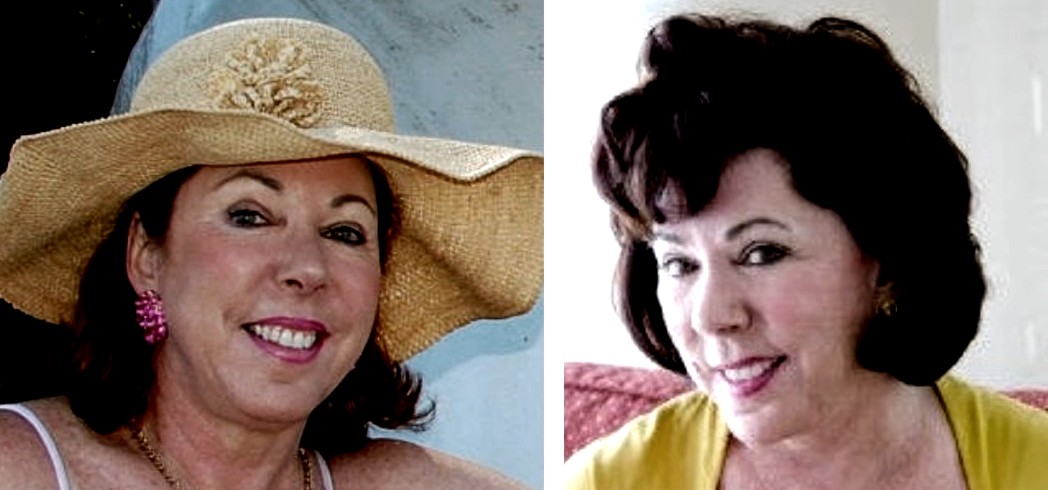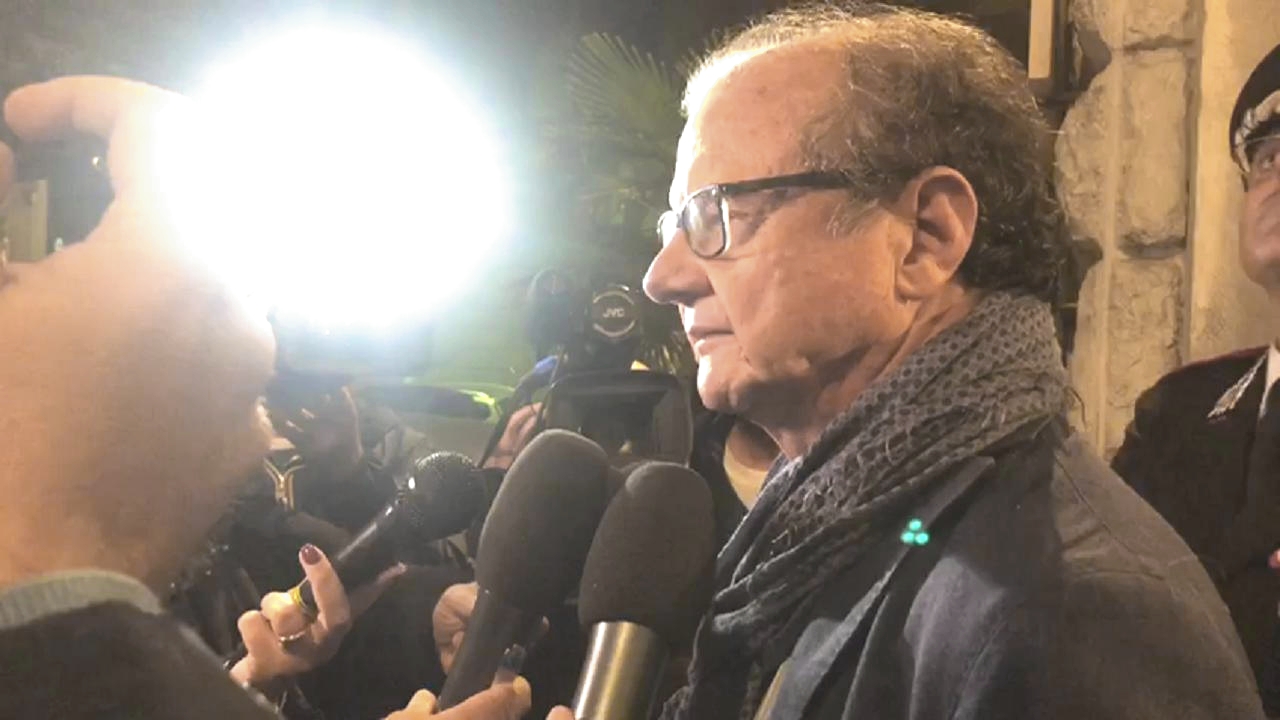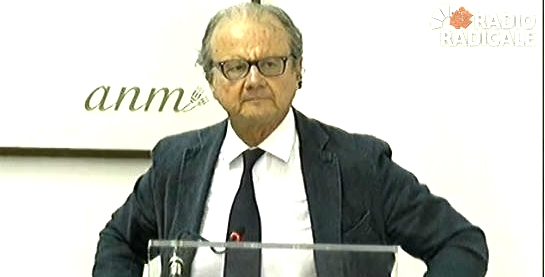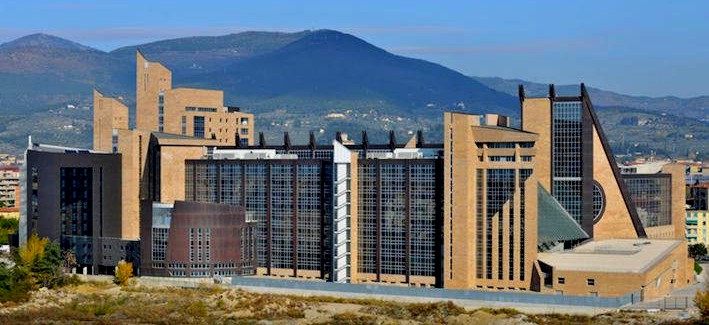
Headsup: Disney's Hulu - mafia tool?! First warning already sent to the Knox series production team about the hoaxes and mafia connections. The Daily Beast's badly duped Grace Harrington calls it "the true story of Knox’s wrongful conviction of the murder of her roommate". Harrington should google "rocco sollecito" for why Italians hesitate to talk freely.
Tuesday, November 26, 2013
Appeal Session #5: Prosecutor Alessandro Crini Concludes, Proposes 30 Years For AK And 26 For RS
Posted by Our Main Posters
Overview
This is the report on the second day of Prosecutor Crnini summarizing the entire case.
This was not attempted at such length at the 2011 Hellman appeal and that panel of judges was perhaps not ever fully in the picture. The first day of the presentation is reported on here.
Real-Time Reporting, Bottom Up
4. Assessment by main poster SeekingUnderstanding
The case put forward by the prosecution and reported to us by Yummi is almost startling in its lucid and concise approach.
It couldn’t be more in contrast to the equivocations and disingenuousness, as well as irrelevant sentimentality that we have unfortunately become used to witnessing. The cutting use of logic was therefore refreshing, and gives grounds for optimism, albeit it tempered by unknowns.
All the issues seemed to be addressed from the base line, as if from primary considerations. And many points were simply politely dismissed as being unimportant to the true case in hand -which is the establishment of the guilt (or not) of the accused. For example, it was great to hear that the reason why the knife had been brought to the cottage need not be examined - it was enough that it was there.
It seemed that where the defence had challenged the evidence, for example suggesting contamination of DNA, it was here that Crini spared no detail, and took time in bottoming out the logic, and dispensing with their points. His arguments certainly carried conviction to me.
I was glad to see motive and behavioural dynamics looked at, as indeed Cassation had requested. It seemed good too that Crini ruled out premeditation, and reduced the dynamics to something highly plausible and believable as well as simple. There are just two points I might observe :
First, it would seem within character for Meredith to have been both open and direct in confronting issues of hygiene, drug use, infringement of privacy and noise etc., (or even theft of rent money, another possibility). I am not convinced that she would necessarily have been aggressively confrontational. Someone who is relaxed within themselves, accepting of their self, is well able to be assertive in a non-provocative manner. That is quite British too - especially old-fashioned English.
Secondly, bearing in mind the possible or probable profiles of the defendants, it would not have taken more than one small trigger of reasonable confrontation to release the consequent temper-tantrum or drug fuelled rage. I do not think we are dealing with something proportionate - and this is also why it escalated in the terrifying way it did. I don’t think it is essential to hypothesize as to what in particular Meredith raised an objection to (e.g. Rudy’s bathroom event). It is probable that Meredith’s concerns were reasonable, and then the overly defensive and angry reaction to any criticism whatsoever was unreasonable. I personally think this is enough.
I liked the way Crini said that even though a source is unreliable or not credible in some ways, that does not mean they do not (inadvertently as it were) give out information that is also true and useful. Possibly other statements from Guede might be taken into account in this way?
As a psychologist, it would seem dialogue with Rudy might yet be fruitful, but, with things the way they remain with the other two, it does not seem the time now for further words. Something else needs to happen.
3. Assessment by main poster James Raper
Crini spent about 10 hours in total addressing the court and was certainly very thorough. Maresca was so impressed that there was no need for him to add anything further.
Crini came to the prosecution case without the baggage of having presented any previous scenario or of having had his reputation sullied and slandered by the Knox PR machine. He reviewed the evidence dispassionately and found it compelling.
Clearly he also found the previous machinations of C&V and the Hellmann court objectionable and went in hard here, even discussing previous cases where Vecchiotti and Conti had goofed up. Hellmann had tried so hard to avoid that coming out during his appeal.
He was not, however, averse to taking a different tack where he thought this was appropriate. A sign of his intellectual honesty which may have impressed the court.
For instance, he thought that there was no need to nail TOD down to 11.30pm as Mignini had sought to do. He allowed for an earlier TOD.
He was of the opinion that coming up with an exact time line for a period in which there is no alibi, and when there is already evidence of involvement in murder, is of only marginal interest.
He spent well over an hour discussing the knife. He did not think it necessary to mull over how it came to be at the cottage. That is speculation that need not detain anyone if the knife is accepted as the murder weapon, and he thinks that on all the evidence it is.
He ruled out premeditation, even as to a hazing, and presented a very simple scenario as to motive and the dynamics behind and during the attack on poor Meredith. Keeping it simple makes it understandable to everyone. Elaborate further and you risk alienating someone who disagrees with the elaboration and thinks they have a better theory.
My only objection is that it is a tad ridiculous to believe that Meredith objected to poop being left in the toilet, the toilet she didn’t use. But yes, the objectionable behaviour of a trio of drunken/drugged up louts invading her space would most likely have triggered argument, unpleasantness and then a fight.
There is plenty of character evidence to support that scenario and with a little imagination, and some recollection of one’s student days, one can easily see how this might have gone. In a way, and Crini admitted to this possibility, Meredith’s own behaviour, or misreading of the situation, may also have been a trigger. Whether one agrees with this or not, it is at least a believable and honest suggestion.
So he set out base camp for the court (bearing in mind that Cassation had suggested that behavioural dynamics be given serious consideration by the appeals court) and whether the judges elaborate further (perhaps by conjecturing a possible range of equally valid motives and dynamics) is up to them.
2. Assessment by main poster Hopeful
Crini is magnificent! He’s absolutely crushing the defense. He nails Knox as having left her bloody shoeprint on the pillow under Meredith.
He accepts Novelli who found Meredith’s trace on the knife. He believes Knox left DNA on the knife. He quotes from differing experts Gill and Balding and says Sollecito’s DNA on the bra clasp stands.
He describes a small, very sharp knife that he believes was used to cut off the bra in several places. He says the knifeprint on the sheet was from the big kitchen knife.
Crini contends that the strong bruise marks around Meredith’s mouth were from restraining her and blocking the scream.
He believes this fight was caused by Meredith angrily reacting to Knox’s constant dirty ways in the cottage and Guede’s nasty toilet habit along with his and Sollecito’s unwanted presence in the cottage that night.
Crini argues a crime of rage when Knox was confronted by Meredith, citing Laura Mezetti’s remarks about the cleaning conflicts. Crini says that Meredith’s scream is what caused the fatal knife blow to silence her.
Not premeditated, the murder was the final result of the perps’ terror that they had gone too far during the raging fight. He’s asking for 30 years for Knox and asks to increase sentence for calunnia to 4 years, inclusive in the 30.
He almost laughs at Knox’s weak excuse over the drops of her blood found in the bathroom, saying she would surely have known if she bled.
He confirms the storekeeper did see Knox early in the morning after the crime. He finds no proof of Sollecito being firmly at his computer sending emails during the crime. He blasts the Knox and Sollecito alibis as being a tissue of lies.
Crini has another ex-Supreme Court justice standing with him in the Florence courtroom! (Baglione). Crini has worked extremely hard. He has conquered this convoluted pack of lies and distortions and his diligence shows. He upturned the applecart of Conti-Vecchioti nonsense and thoroughly redeemed Stefanoni’s findings.
He has completely severed the heads of this Medusa Gorgon mess, Crini is the bomb!
1. Tweets continue from main poster Yummi
114. This means a total request of 30 years for Knox and 26 years for Sollecito
113. [Propose] 26 years for both for the murder
112. The murder is contextual, their was no premeditation, and no futile motive
111. Because of their staging and denials, they should not be given generic mitigation for murder.
110. Requests to increase the penalty for [Knox] calunnia to 4 years
109. But experience tells statements of unreliable perps do contain revelations about the truth. The ‘argument’ between girls, why such context?
108. Rudy Guede has no credibility, even if the Supreme Court is right that this cannot depend on his refusal to answer.
107. Crini cites Laura Mezzetti about the ‘annoyance’ caused by Knox on house cleaning issues.
106. Meredith was the one triggering an argument because of the ‘impolite’ invasion and behavior. She accused Knox .
105. Rudy was not sober, quite high, a bit annoying, and was acting the same disgusting way he behaved downstairs days before.
104. Meredith Kercher was sober, fully awake. The others were at least ‘smoked’, a bit high, Rudy was there in the house.
103. The motive is not futile, the motive is terror, it is the consequence of the prior aggressive action in which they were involved.
102. Nothing points to an agreed plan among the three that run out of control; the first cause was an aggression, a clash, impetus of rage
101. Crini: there is a prosecution duty to conjecture a motive.
100. The blood drop on the tap: a point is Knox does not explain, guesses, while she must be aware that she bled in the bathroom.
99. Crini believes the shoe prints on the pillowcase are from a female’s shoe as suggested by police
98. Knox’s DNA between the blade and the handle (36-i)is very significant. It’s not from sweat or contact.
97. The print on the bed sheet is compatible with the kitchen knife.
96. Crini: we don’t need to figure a reason for a kitchen knife to be carried from one apartment to the other..
95. The bra straps are cut in multiple points, not with a kitchen knife.
94. Sollecito cut her bra with a knife in multiple parts. hold bra to cut it - no Guede’s DNA in that point - used a small very sharp-edge knife
93. Rudy did not stab her, because he wad used both his hands, which were unarmed
92. Wounds indicate she was immobilized by multiple people, they killed her because failing to do so completely, were terrified by her scream.
91. Criticizes Torre’s theory that the large wound could be caused by a small knife: improbable, the wound has clear margins.
90. There were two knifes, one was small, not much fit to kill.
89. Ridiculous to think that Rudy Guede - which she knew - could intimidate Meredith totally to that point. She would react.
88. Specific indicator: no defence wounds; means bruises are not from fight but restraint.
87. Description of bruises and lesions around her mouth, indicates extreme force to prevent from screaming. Rest of body was also immobilized.
86. She was still wearing a blue sweater which was removed subsequently.
85. Analysis of blood drop pattern and position of victim when stabbed; body moved in a different position.
84. Location of crime - space between the bed and the wardrobe - is peculiar, analysed by UACV
83. Crini says will sketch a dynamic of events of the crime.
82. Crini says - implying Vecchiotti, Pascali - some experts should be “hold where they belong”
81. Crini recall Pascali working on the Olgiata and the Claps case (2008, 2010);
80. There is no instance of transfer of Sollecito’s DNA anywhere on the scene
79. Crini cites the Olgiata case.
78. Contamination must be deduced from context of finding and collection. You must think a practical way for Sollecito’s DNA to be transferred
77. Tagliabracci defends Vecchiotti saying the RIS statistical techniques were not used at the time; Crini cites Gill and Balding
76. Guede’s Y haplotype in victim’s vagina alone was used to identify him.
75. Sollecito’s DNA is certainly on the clasp for the police; Vecchiotti doubts but considers X separately from Y haplotype
74. The bra clasp: the first objection was the interpretation of the mixed/complex trace
73. Crini says he learned a bit of genetics working on cold cases
72. Vecchiotti and Tagliabracci have a reliability problem in relation to the case, for different reasons
71. Vecchiotti said she obtained all cooperation she required. Raw data could be accessed by accessing the machine itself as Stefanoni offered.
70. Crini says he found out the negative controls were deposited, the court will find the document of deposit etc.
69. Vecchiotti omitted to note the censures/observations written by the other consultants, this procedure is incorrect
68. Vecchiotti’s approach to the I-trace (refusal to test it ) was ‘ideological’, ‘weak’, ‘insufficient’
67. Interpretation of profile is for complex result. For non-complex profiles there is actually no ‘interpretation’.
66. Crini recalls answers by the RIS, defence tried to elicit approval of CV, but RIS said multiple test only if possible, compromise for result
65. Novelli cited saying the profile of Meredith is certain.
64. Meredith’s profile came out clean on a single amplification, means the trace is clear.
63. The meaning of test repetition is its necessity when you have a ‘dirty’, uncertain sequence like Knox’s profile on the knife
62. Novelli knows very well about double and triple amplification protocols, and Stefanoni knows well too
61. Guidelines are an indication that guide your driver, but then you have to drive
60. Someone who keeps a refrigerator like the one Vecchiotti has, should be less critical about laboratory practice
59. Crini: should we toss any result in the garbage, no matter how important and clear, whenever the test is not repeated?
58. Speaks about the single amplification by Stefanoni versus guidelines.
57. The presence of human DNA in a scratch on the blade of a knife itself is not usual
56. Crini: another introduction specific on DNA; notes btw that the new RIS finding is ‘important’ because adds information
55. Crini makes an introduction about circumstantial evidence
54. Discussion on DNA and remaining evidence will start in 1h.
53. Francesco Sollecito [in interview] was shocked, said he never expected so aggressive arguments from PG [the Tuscany Prosecutor General]
52. Yesterday, Crini spent the first hour to argue about logical ‘method’: how assess evidence altogether, examples, quotes of SC sentences
Monday, November 25, 2013
Appeal Session #4: Today Lead Prosecutor Alessandro Crini Summarises The Prosecution’s Case
Posted by Our Main Posters
Overview
This is the report on the first day of Prosecutor Crnini summarizing the entire case.
This was not attempted at such length at the 2011 Hellman appeal and that panel of judges was perhaps not ever fully in the picture. The second day of the presentation is reported on here.
Real-Time Reporting, Bottom-Up
5. Good reporting on the court today
Andrea Vogt has posted an objective report here and Barbie Nadeau an objective report here. We will post excerpts from both and other sources after the appeal session on Tuesday is done.
5. Warning about AP’s Colleen Barry
The Associated Press’s Colleen Barry is once again filing highly biased reports from the court. This is an appeal by Knox and Sollecito AGAINST a guilty verdict (by Judge Massei) and not an appeal by the prosecution to “reinstate” a guilty verdict. Get a grip.
4. Final post from the court today
It is 5:30 pm in Italy. Judge Nencini has declared today’s session at an end and he has allowed the prosecution to resume its presentation tomorrow. Prosecutor Crini has about 1/3 of his presentation on the evidence still to come.
3. Tweets from main poster Yummi
Yummi has warned us that the wireless internet bandwidth inside and just outside the courtroom gets overloaded late in the day as the reporters get busy on their reports. Yummi does have a way around this but it involves leaving the courtroom when key arguments might be made and walking some distance away. So there might be some slight delays.
[More pending; Dr Crini has alerted that his presentation will be in 16 chapters]
51. [Judge] Nencini suggests to interrupt and go on tomorrow with following prosecution’s points. New schedule.
50. Chapter 11. is DNA. Crini says we may have evidence enough by now anyway
49. Crini censures Hellmann-Zanetti’s reasoning about calunnia (why not indicate the real culprit?). Says H-Z committed ‘physical violence’ on trial file
48. Knox’s calunnia is a strategy protracted over time says Crini
47. Dreamlike component in Knox’s statement, fish blood, are devices needed to surround a calunnia strategy
46. Knox needed to put some additional content into the ‘calunnia’, says Crini, or wouldn’t be believed, so she puts in pieces of truth
45. Knox spoke about a scream an a sexual violence before anyone knew. Sollecito said nothing was stolen before they knew.
44. Points out Sollecito says Romanelli’s door was wide open; Knox doesn’t notice theft. Crini highlights the ‘combination’ of inconsistencies
43. Knox thinks locked door is normal; does not flush toilet when finds feces; does not notice blood before having a shower; thinks blood is ok
42. Notes Knox’s statements are inconsistent and ommisive before her interrogation.
41. Crini speaks about Knox’s declarations. Interested in the timings. Says too much was repeated to be coerced.
40. Crini speaks about chapter 9, the statements of Sollecito. His call to her sister. His alert was late but even so preceded the postals arrive
39. Bathmat print and luminol prints were chapter 7. of Crini’s argument; 8. is the staging of theft.
38. The most significant stain may be the one in Romanelli’s room, says Crini.
37. Speaking of a female’s print left in luminol, Crini sounds outraged, saying other substances is vague unsubstantiated conjecture [eg it was blood not bleach]
36. Guede’s sentencing was not well calibrated says Crini. But a Guede alone scenario is not tenable
35. Does it make sense for Guede to leave there the evidence of (putative) theft, and clean footprints?
34. The unitary sense made by elements like the bloody print, is a cleanup. Considers the lone-perp scenario: inconsistent
33. Crini: starts talking about the isolated bloody print; calls it a ‘talking element’. Why is that print alone?
32. Suspects are only ones with a ‘logistic’ capability and an interest to ‘clean’ the murder scene. They aimed at ‘diminishing’ the evidence mass
31. Knox’s lamp was the only light in her room.
30. Crini: the perp(s) organized a rather complex plan to clean up and ‘sidetrack’ at the murder scene.
29. Still to be determined if calunnia was “occasional” due to pressure, or “aggravated” [sidetracking]; Crini saya a ‘depistaggio reale’ (sidetracking) occurred
28. Crini: suspects’ statements are extremely interesting: RS’s statements; AK’s e-mail, internet statements, [Knox’s] memoriale
27. Crini: a most fertile chapter of analysis is the ‘post-factum’ actions and behaviors of defendants
26. Crini has unfolded five chapters. Says he has a total of sixteen
25. Quintavalle, details of his testimony and woman’s description are exceptional indicators of accuracy.
34. Crini: it is unlikely that Quintavalle got it wrong. Because of contextual elements.
23. It is incorrect to dismiss a witness a priori because late. But for reasons totally different. Sometimes late is symptom of reliability.
22. Wants to deal with the issue of the fact that he came forward late, urged by an acquaintance
21. Crini: fifth argument is Quintavalle. He says he is sure about his testimony. Is a different kind of witness
20. Crini accepts both alternatives on time of death, after 23.15 or before 22.30 (but seems to prefer the earlier one)
19. Crini: Do not overestimate importance of timings that are not anchored accurately or cannot be proven
18. Crini: timeline is marginal to the case. All unproven timings to be taken cautiously.
17. Crini starts fourth theme: timings. Says they are very vague, except the tow truck
16. Crini: Curatolo is no ‘super-witness’, but can contribute to helping the court to draw their scenario
15. Curatolo saw a couple discussing and this memory is very specific, peculiar
14. Curatolo did not confuse night with Halloween, because it was big party in piazza the previous night, and because it did not rain
13. Crini: the court saw Aviello, shows what top [level] of unreliability is; the SC suspected so unreliable that calunnia elements had to be assessed
12. Crini: many trials could not exist if drug addicted testimonies were dismissed
11. Crini: the H-Z court assessed Curatolo a priori based on him as a person, stemming from questions of the court itself
10. Crini about Curatolo, describes Piazza Grimana; he was an habitual presence of the piazza, proven reliable in other cases
9. Crini: computer records and alibi point to Sollecito being not at home but on murder scene
8. Crini cites the log files of Fastweb: no internet activity, only automatic connections.
7. Crini: failure of computer alibi is evidence against, not just lack of confirmation.
6. Nencini notes prosecution did not ask to interrogate Sollecito. Crini cites D’Ambrosio’s computer expert report. No interaction before 5am
5. Sollecito gave computer alibi days later, and words his statement in the singular form.
4. Crini: first theme he deals with is presence of crime scene; alibi, if it’s false it is evidence no matter why false (cite from Guede trial)
3. Crini attacks the method of logic reasoning of annulled appeal: parceling out evidence, parrots aspects of civil procedure
2. Crini: Supreme Court censure was against the foundations of appeal , all parts not just some errors; appeal was ‘razed to ground’.
1. Crini: this appeal is unusual, not because of the case but for the course followed. Usually appeals are narrow, this SC annulment is not.
2. Tweets by Andrea Vogt
3. At Crini’s side in amandaknox appeal today is veteran Florentine prosecutor Tindari Baglione. Before this, he was in Cassazione.
2. Prosecutor Crini in Florence: don’t repeat error of Perugia appeal. Consider evidence wholly, including Curatolo.
1. Will prosecutors ask life sentences in amandaknox appeal today? Will Sollecito’s presence in court benefit him? Verdict January 10.
1. Prosecution Begins
This is the prosecution’s day. Sollecito is reported as being in court but low-key.
Various reporting notes the significant presence of Dr Tindari Baglione, formerly with the Supreme Court, about whom we posted on in September as follows:
The new Prosecutor General of Tuscany (Florence’s region) Dr Tindari Baglione, the chief prosecutor of Tuscany’s appeal court, is selecting the prosecutors for the appeal. He arrived in Florence in May of this year. He is said to be formidably unbending. He recently imposed tough sentences on 27 people for the environmental damage caused by illegal work in Mugello on the high speed rail link between Florence and Bologna.
Tuesday, November 12, 2013
Differences Between Micheli, Massei, Hellmann and Nencini Courts Pointing To Almost Certain Outcome
Posted by Peter Quennell
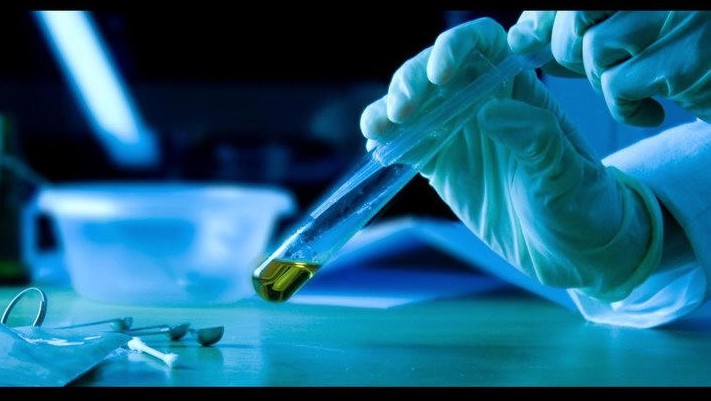
What are the biggest differences? In fact the Supreme Court already pointed them out: science, scope, and balance.
Judge Micheli, Judge Massei and Judge Nencini all have a very extensive criminal-case background. All three have handled many cases of murder, many cases against the mafia, and many cases involving criminal science. All three have remarkable success records and have hardly ever been overturned on appeal.
Judge Hellmann and his court are the extreme outliers. Until forced into early retirement by the Council of Magistrates, he had been a (quite good) business judge. His one major criminal case, years ago, had led to a farcical outcome, and he was ridiculed for this at the time.
Cassation made it very clear that he simply did not reflect a knowledge of the precise Italian law on scope and balance at the appeal level, and that he mishandled the science. In fact, as he actually said, the reason he appointed two independent DNA consultants was that he was at sea on the science.
That left Judge Hellmann’s panel of judges like a rudderless ship, bereft of the kind of good guidance from the lead judge on science, scope, and balance that comes only from many years of experience.
Which, given a level playing field, the pathbreaking Italian system enforces competently like almost no other.
Above all as the Hellmann Report makes extraordinarily plain, his court came to be swayed by the CSI Effect, with the help of two tainted consultants and probably the irresponsible Greg Hampikian in Idaho.
The CSI Effect is a phenomenon very, very unlikely to happen in Judge Nencini’s court. First, take a look at this good explanation of what the CSI Effect is in the Fox Kansas City video.
Many crime shows such as the BBC mysteries and the Law & Order series and spinoffs show investigators solving their crimes in the old-fashioned way. Lots of witness interviews and alibi and database checking, and walking around and loose ends and lying awake at night puzzling. And often there’s a big stroke of luck.
But if you watch the very popular CSI Las Vegas series and its spinoffs in Miami and New York, and the various clones on other networks, you will see something very different indeed.
When those shows first began airing worldwide in the late nineties, the producers explained that audiences increasingly appreciate learning something new when watching a show, and it is true, one sure can load up on the trivia.
But you will also see the US equivalent of Dr Stefanoni and her forensic team in those shows, roaming far beyond the narrow crime scene, interrogating witnesses and checking alibis and finding a lot of non-forensic evidence, and even at times drawing guns.
Most unreal is that, time and again, the forensic evidence testing is clearcut and takes just a few minutes and instantly clinches the case.
- There are several articles like this one and this one on whether the Casey Anthony jury was affected by a shortfall in the starkness of the forensics when the behavioral evidence seemed so strong.
- There are several articles like this one and this one on whether the appeal verdict outcome in Perugia might be affected in the same way.
- There are many articles like this one and this one and this one and especially this one saying there is a tough added burden on investigators and juries without a commensurate improved outcome.
With conviction rates declining in the US and Europe, professionals are taking a scientific look at whether the CSI Effect is one big cause of that decline.
At the macro level in the US this writer doubted that the CSI Effect is fatally unbalancing takes on the wider evidence. The same conclusion was reached in this first major study at the micro level.
But the belief in the CSI Effect continues. Articles like this one on an Australian site talk of a backlash against too many acquittals. Some articles like this one argue that maybe lay juries are out of their depths.
And judges and prosecutions are taking countermeasures.
In Ohio and many other states prosecutors and judges are acting against a possible CSI Effect in their selection and briefing of juries. And an NPR report came up with these findings.
Some states now allow lawyers to strike potential jurors based on their TV habits. Judges are issuing instructions that warn juries about expecting too much scientific evidence based on what they see on TV.
In the field, Shelton says death investigators sometimes run useless tests, just to show they went the extra CSI mile.
“They will perform scientific tests and present evidence of that to the jury. Even if the results don’t show guilt or innocence either way, just to show the jury that they did it.”
This is coming at a time when death investigators in America have no resources to spare. An investigation by NPR, PBS Frontline and ProPublica shows some states have already opted not to do autopsies on suicides, others don’t autopsy people who die in traffic accidents, and many don’t autopsy people who die over the age of 60.
But Murphy, the Clark County coroner, expects things to get worse.
“You know, we’re in budget cuts right now. Everybody’s in budget cuts. Las Vegas is no different than anybody else. We’re hurting. We’re going to feel that same crunch as everybody else,” he says.
One of Zuiker’s great disappointments is that, for all its popularity, his fictional Las Vegas crime lab didn’t generate more political support to fund death investigation.
“I’ve done my job. You know, we’ve launched three shows that cater to 73.8 million people a week and is a global phenomenon and the largest television franchise in history. We hoped that the show would raise awareness and get more funding into crime labs so people felt safe in their communities. And we’re still hoping that the government will catch up.”
None of the science in Meredith’s case has ever been discredited in court. Even in Judge Hellmann’s court the agenda-driven independent consultants Conti and Vecchiotti failed - and under cross-examination admitted it.
Also remember that the Hellmann court did not get to see two very key closed-court scientific presentations (the stark recreation of the attack on Meredith, in a day of testimony, and later in a 15 minute video) which had a very big balancing effect on the Massei court.
Right now the reputation of not one defense-campaign stooge who has attacked the science remains intact.
Greg Hampikian has headed for cover. He had widely proclaimed that he clinched the Hellmann court’s outcome, in an act which may well have been illegal. Unsurprisingly, he is now trying very hard to hide his own claimed “proof ” of shortfalls in the science, as Andrea Vogt has been showing in her Boise State University investigation, and as we will soon post more on.
Saul Kassin is another defense-campaign stooge who falsely claimed that he clinched the Hellmann court outcome by “proving” a false confession by Knox - in an interrogation that never even took place.
Despite all of this, maybe as straw-snatching, we can again see an organized attempt to confuse American opinion on the science of the case.
Whether she did this intentionally or not, that is what the PR tool Colleen Barry of the Associated Press was doing when she omitted that the trace of Meredith on the knife is undisputed hard evidence.
Judge Micheli and Judge Massei handled the science, scope, and balance with some brilliance. In all three dimensions Judge Hellmann fell short abysmally.
What is your own bet on the outcome under the exceptionally experienced Judge Nencini?
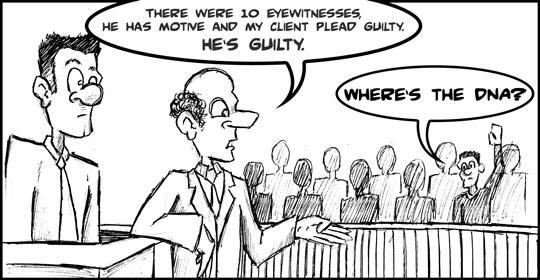
Parts of this post were first posted in 2011 after the disputed and much examined outcome of the Casey Anthony murder trial..
Sunday, November 10, 2013
The Crime-Scene Clean-Up: How Rudy Guede’s Diary Provides Even More Proof That It Happened
Posted by pat az
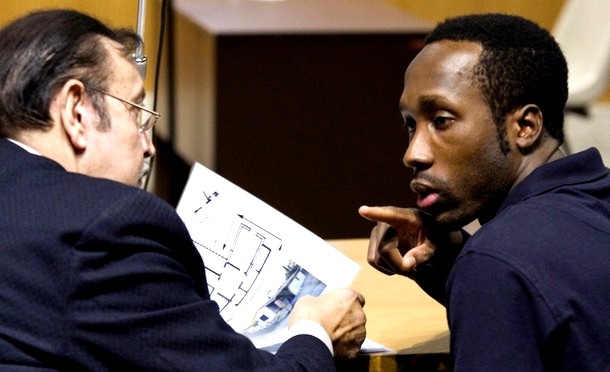
This post is crossposted from my own place. Here is one of my previous crime scene analyses on TJMK.
Rudy Guede was ultimately declared convicted by the Supreme Court in 2010 of participating in the 2007 murder of Meredith Kercher.
The prosecution claims the two other participants are Amanda Knox and Raffaele Sollecito. Knox and Sollecito are currently appealing their conviction of the same crime.
The case against the three of them involves a suspected clean up of the hallway in the apartment after the crime. Meredith’s blood was found in the bathroom, and half a footprint in her blood was found on the bathroom mat. However, there was no visible blood between Meredith’s bedroom and the bathroom.
The only visible blood in the hallway were faint partial shoe prints that led directly out the front door of the apartment.
After the murder was discovered, the media reported almost daily on developments in the case. The day of the murder, the press reported on the blood found in the bathroom and the bedroom.
But until police used luminol at the apartment on December 18th, the media didn’t report on any significant blood found in the hallway. Between November 2nd and December 18th, only one person stated that significant amounts of blood had been in the hallway.
Rudy Guede.
Rudy Guede actually wrote about it in his diary between Nov 20th and Dec 6th, after being captured in Germany.

The police arrived at the apartment on November 2nd. According to media reports, the blood they spotted immediately was only in the bathroom and Meredith’s bedroom. When the scene was more closely examined, after the discovery of the body, police found visible blood patterns on the floor left by Guede’s left shoe as he left the apartment.
None of the people who arrived in the apartment on the afternoon of November 2nd reported seeing them; these footprints are not in any of the stories of the events of Nov 2nd told by Amanda Knox nor Raffaele Sollecito. So, while these prints were visible, they were not substantially obvious.
On December 18th 2007 investigators applied Luminol in the hallway and other bedrooms. This forensic chemical is used to detect blood which has been cleaned away. The Luminol revealed several footprints in the hallway between the bedrooms of Knox and Meredith. Example below. Some of these footprints were leading towards Meredith’s door.
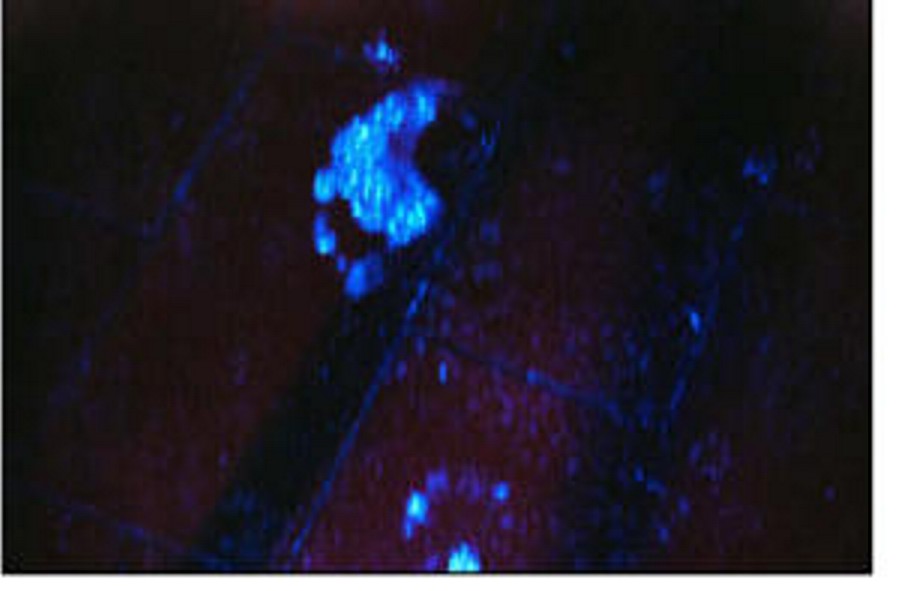
They also discovered prints in Filomena’s room which contained Meredith’s DNA and Amanda Knox’s DNA. They also revealed a footprint in Amanda Knox’s bedroom. (The defense unsuccessfully contested the investigator’s conclusions that these prints were made with blood).
On November 19 2007, an international arrest warrant was issued for Rudy Guede. He was arrested in Germany on November 20th. Guede remained in Germany until his extradition on December 3rd.
During his stay in jail in Germany, Guede wrote a long statement that was published and translated. Guede’s writings are similar to to Knox’s jail writings in many ways - they both try to write out their own detailed version of events, while pointing blame elsewhere.
But Guede’s comments may in fact be confirmation of a clean-up after the murder of Meredith Kercher (emphasis added):
I am asking myself how is it possible that Amanda could have slept in all that mess, and took a shower with all that blood in the bathroom and corridor? (Guede, Germany Diary, P21)
The police did not find evidence of any other blood until December 18th, AFTER Guede returned from Germany. As indicated above, the luminol revealed multiple footprints in the hallway, in Knox’s bedroom, and in Filomena’s bedroom. The image below shows these results in blue. Guede’s partial footprints are shown in red.
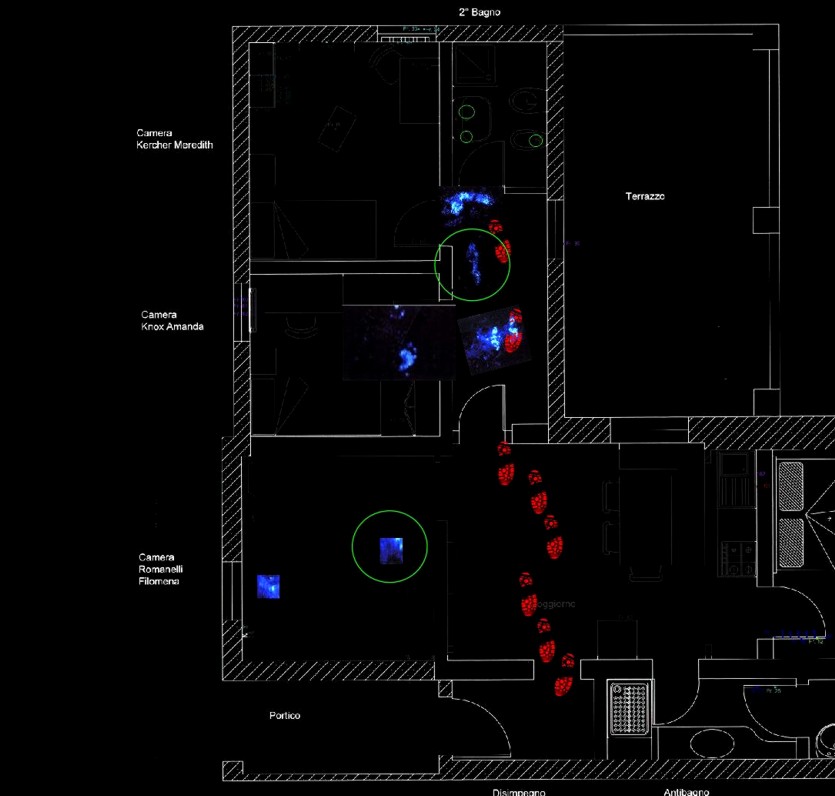
The conclusion is inescapable: Guede knew there would be significant evidence of blood in the hallway, before the police themselves found that evidence.
How did Guede know there would be more blood found in the hallway, before the police found that evidence on December 18th? And why wasn’t that blood there on the morning of November 2nd?
The courts believe the blood in the hallway was cleaned after the murder of Meredith Kercher. And the Micheli and Massei courts believed only one person had the motivation to hide this evidence: Amanda Knox.
Here is a summary of Judge Micheli’s October 2008 indictment finding.
In Judge Massei’s December 2009 trial finding for the original conviction of Knox and Sollecito, he also writes about the clean-up that the judges believed to have happened:
Further confirmation is constituted by the fact that, after Meredith’s murder, it is clear that some traces were definitely eliminated, a cleaning activity was certainly carried out. In fact, the bare foot which, stained with blood, left its footprint on the sky-blue mat in the bathroom, could only have reached that mat by taking steps which should have left other footprints on the floor, also marked out in blood just like (in fact, most likely, with even more [blood], since they were created before the footprint printed on the mat) the one found on the mat itself. Of such other very visible footprints of a bloody bare foot, on the contrary, there is no trace. (Massei, Dec 09; PMF translation)
In defense of Guede, Knox, and Sollecito, some might try to claim that Guede heard about blood in the hallway in the news. Rudy Guede was arrested 18 days following the murder of Meredith Kercher. During that time he had access to read the news and watch reports.
I have searched for articles in the period between November 2nd and December 18 which mention blood. All of the articles I have found so far discuss blood in the bedroom or the bathroom. One or two discuss footprints leading to the front door.
None of them discuss blood in the hallway that would justify a statement from Guede of “tutto quel sangue nel bagno e sul corridoghe” (all that blood in the bathroom and in the corridor)
Guede himself said he went between the bedroom and the bathroom, so may have tracked blood into the bathroom and therefore known blood would be found in the hallway.
Even that knowledge however confirms a clean-up, as there was not a trail of blood between the bathroom and Meredith’s room that justifies the footprint on the bathmat and blood found in the bathroom.
I have my own questions as a result of Guede’s knowledge of blood in the hallway:
Could the attack have started in the hallway? Could the first blood shed have been on the hallway tiles?
The prosecution and courts argue that Amanda Knox had a role in the attack and murder. Knox and her supporters are very adamant that there is no trace of Knox in Meredith’s bedroom. While the courts argue otherwise, could Knox’s role have been limited to the hallway?
Sadly, we may never know the full truth of what happened on the evening of November 1st, 2007.
My timeline of media reports on blood
- Nov 2nd: Meredith Kercher found. Blood found in bathroom.
- Nov 5th: Police analyzing traces of blood from apartment below.
- Nov 5th: A “trail of blood” is on the inside handle of the door to the apartment.
- Nov 7th: reports of Amanda Knox’s statements, includes finding blood in the bathroom.
- Nov 14th: Police use of Luminol at Sollectio’s house. First reports on the knife seized by police from Sollecito’s house.
- Nov 19th: Analysis of blood in bedroom (pillow, bra, etc).
- Nov 22nd: Guede’s prints in blood.
- Nov 27th: Amanda Knox’s blood on bathroom tap.
- Nov 28th: Blood in bathroom.
- Dec 5th: Reports of Guede’s letter to father: “there was so much blood”.
My timeline of main events involving Guede
- Nov 2nd, 2am ““ 4:30 am: Guede seen by witnesses at Domus nightclub.
- Nov 3: Guede leaves Perugia for Germany
- Nov 11: Guede’s cell phone tracked in Milan (Corriere)
- Nov 12: Newspaper reports a 4th suspect.
- Nov 19: Guede identified as suspect in newspapers
- Nov 19: Guede skype conversation with friend.
- Nov 20: Patrick released from prison.
- Nov 20: Guede arrested while trying to return to italy on train in Germany.
- Nov 21: Guede interrogated by German police; Guede admits to being at apartment, blames an italian man for murder.
- Nov 20-Dec 5: Guede writes diary in German prison.
- Dec 3: Germany grants Guede’s extradition back to Italy.
- Dec 6: Guede returns to Perugia.
- Dec 7: Guede interrogated by Magistrate.
- Dec 14: Guede ordered to remain in prison.
- Dec 17: Knox is questioned by Mignini.
- Dec 18: Police use luminol in apartment and find footprints in hallway and in Filomena’s bedroom.
Wednesday, November 06, 2013
Appeal Session #3: The Carabinieri Labs Report On The DNA On The Knife
Posted by Our Main Posters
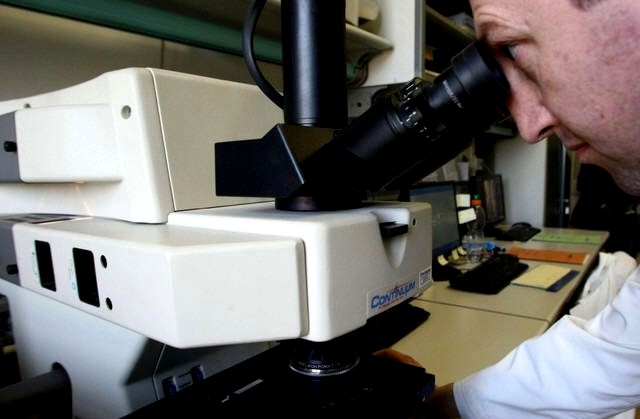
[Above: an image of similar testing in the same Carabinieri laboratory in north Rome]
Final Update
So the court session does not even extend beyond the lunch hour. Good morning Seattle! At this moment it is still only 3:30 in the morning there. Only night owls will know what happened.
Yummi and Mason2 may have more for us, which will appear either here below this final update on in Comments. Also Andrea Vogt and hopefully Barbie Nadeau will be filing longer reports in English. We will also check out all the Italian reporting.
Hard to see any game changers in today’s strong but undramatic testimony. The Carabinieri RIS DNA experts could not be shaken. All momentum remains with the prosecution and with the Supreme Court’s “givens” on the evidence, such as the presence of three attackers in Meredith’s room.
The defenses seem to be giving up. They could have phoned it in. Sollecito lawyer Bongiorno didnt make any new fuss. And Amanda Knox lawyer Dalla Vedova was cut off by the lead judge several times, for trickily going off the point. He really is out of his depth in a criminal trial; at the same time often condescending.
And a seeming big slap in the face for the American defense stooge Greg Hampikian who seems to have illegally colluded with the disgraced Hellmann consultants Conti and Vecchiotti (who were not even mentioned today) when Judge Nencini asked Dr Barni “Would you be able to provide reliable standards without using suggestions from Americans?” Dr Barni responded “Of course”.
And Sollecito “wasted” his statement by whining about his life, showing no compassion for Meredith (despite his claimed visit to her grave), and not answering any of the dozens of open questions. Sollecito really needed to show he is both strong and compassionate and NOT a weakling under the thumb of Amanda - but he seems to have done quite the opposite. The family lawyer must not be too pleased.
Fifth Update
The opening of Frank Sforza’s trial in the same courthouse is postponed, apparently because new information on his campaign to poison opinion against the judiciary and his unsavory connections has been coming in.
Information will be exchanged that is gathered at this trial on mafiosos Luciano Aviello and at Aviello’s own trial for obstruction of justice which is now proceeding in the same Florence courthouse in parallel.
The findings and possible charges on the defamatory and dishonest books by Knox and Sollecito are due about now from the Florence and Bergamo prosecutors. Information gathered in those investigations could also be fed in to this process, or put aside for separate trials.
As both the AK and RS books are bulging with the standard PR talking points (some of which flowed from Frank Sforza and Doug Preston) in a sense it will be Curt Knox, the Mellases, Marriott, Sforza, Fischer and Moore who will be put under the microscope.
Fourth Update
A more detailed report on the DNA phase today from the Andrea Vogt website.
The RIS Wednesday deposited their forensic report on trace 36i, a spot of DNA identified (but not earlier tested) on the kitchen knife alleged to be the murder weapon. “Cento Percento” (100 percent) said Major Berti, discussing compatibility. The RIS found that the DNA was compatible with Amanda Knox, and excluded that it was that of Sollecito, Guede or Kercher.
The RIS expert was asked only a few questions from attorneys and the judge. The judge asked why the RIS had done two amplications of the DNA and not 3 or 4. Major Berti described that two is considered the minimum number of amplifications necessary, according to today’s forensic standards, doing less (or more) might have diminished the reliability of the results. The judge also asked about the age of the equipment used. Berti responded that the forensic kit used this time has been commercialized since 2010 and available for use since 2011.
At one point the judge stopped a line of questioning by Knox’s Rome attorney Carlo Dalla Vedova, who was asking why the RIS described Knox’s DNA as “fluids” when a prior expert had said the trace did not come from blood. Nencini said: That question was not put to the RIS by this court, it was not their job to determine that. The other experts’ reports are in the case files for everyone to read, he noted, adding: “We cannot put words in the mouth of this expert that were said by another expert.”
Third Update
Tweets from our main poster Yummi (Machiavelli)
32. Judge Nencini’s comments were always addressed at Dalla Vedova’s arguments, who was in fact a bit silly
31. The Judge declared the evidence phase closed. Next court dates are 25 November for prosecution argument and 26 for the defences with 16 and 17 December.
30. Judge Nencini asked Dr Barni “would you be able to provide reliable standards without using suggestions from Americans?” Dr Barni: “of course”
29. Dalla Vedova said Tagliabracci was the only Italian source in the RIS report, all others are foreigners, emphasized the American labs…
28. Sollecito said his family absolutely never had issues with justice. And he is a proud ‘member’ of that family
27. He also played the ‘national’ card, as he remphasized ‘I am Italian’ twice and then addressed the court ‘I am an Italian, as you are’
26. Sollecito mentioned the defens’s arguments (he has an orthopedical issue with his foot etc.).
25. The questions of all parties to the experts were intended to elicit information to be used in arguing the unrelated previous finding
24. He mentioned Meredith’s name only once, to say he barely knew her.
23. Sollecito talked with a faint voice, a long speech in which he described himself as a victim.
22. The Carabinieri say that there are only a few governmental laboratories which have the 17025 certificate (the Carabinieri and the Police)
21. Nencini stops Dalla Vedova, points out that scientific community is international
20. Dalla Vedova tries to elicit that the good standards are not the Italian ones.
19. The RIS obtained the ISO9001 certificate in 2008, and a more specific certificate in 2012.
18. Bongiorno asks RIS to explain why two amplifications are recommended.
17. Prosecutor Crini asks if there are criteria to distinguish which labs or which experts are more competent.
16. Speaking about their software which allows to weight probabilities of attribution.
15. They note that three alleles which are ‘alien’ were drop off in one duplicate.
14. The biologic method has a ‘consensus’ interpretation and a ‘composite’ interpretation, two ways to interpret the double result.
13. They describe the methods employed, the ‘biologic’ method and the ‘statistic’ method.
12. Absence of any male trace stands out as a feature of the sample (all contributors are females)
11. They extracted two profiles in a duplicate in agreement with experts of all parties
10. Dr Berti says the sample was a low template. They have a strategy to obtain reliable results.
9. Points out that documentation says sample 36i comes from insertion of blade in the handle.
8. Dr. Berti summarizes the recovery of sample in Vecchiotti’s lab.
7. Bongiorno says Sollecito intends to release a spontaneous declaration. He will do that after the experts testimony.
6. Berti and Barni enter the court.
5. Many law students from the Florence school for Magistrates are in court to follow the hearing.
4. Sollecito had managed to enter the courtroom from side entrance eluding photographers. Carlo Torre arrives in court.
3. Giulia Bongiorno & Raff kiss each other. Giulia, Raff & Father have a worried discussion
2. I wonder… will the court withdraw his passport?
1. Raffaele Sollecito is in courtroom. Walking in empty room, few people waiting. Hearing will start 1/2h probably
Second Update
Tweets from Patricia Thomas (AP) and Sabina Castelfranco (AP)
Patricia Thomas “@MozzarellaMamma: RaffaeleSollecito - Amanda Knox and I were very carefree and isolated in our love nest.
Sabina Castelfranco “@SCastelfranco: Sollecito says he is not the assassin he has been described as. Says Amanda was his first love
Patricia Thomas “@MozzarellaMamma: RaffaeleSollecito - I have been described as an assassin. Amanda Knox was my first real love in life
Patricia Thomas “@MozzarellaMamma: RaffaeleSollecito takes stand to make statement, starts complaining about media descriptions of himself
First Update
Tweets from Barbie Nadeau
35. Nov 25 - prosecution; 26 - civil; Dec 16 - Sollectio; 17 - Knox; Jan 9 - rebuttals, 10 deliberation and verdict
34. Dec. 16, 17 closing arguments for Knox and Sollecito
33. Judge closes hearing for day, says closing arguments begin Nov 25, 26, must find December dates to conclude
32. Sollecito finishes by thanking judges for their time, judge tells him he can intervene any time during rest of appeal until they deliberate
31. Sollecito says he hates the fame, how it has hurt him, how it isn’t fair
20. Sollecito says he has a difficult time looking for work, people associate him with the murder of meredith kercher
29. Sollecito says that even on his vacation in Dominican Republic, he had to defend himself like a public figure, his life is judged by all
28. Sollecito repeats twice that he never met Rudy Guede, how nothing in original trial was based on reality.
27. Sollecito takes trip down memory lane, highlights worst parts of trial and incarceration for him, has not mentioned meredith kercher yet
26. RaffaeleSollecito - I feel a persecution. It is a nightmare, beyond all imagination.
25. RaffaeleSollecito—close to tears as he testifies to court “I am fighting every day to bring out the truth”
24. Jury totally transfixed by sollecito declaration, can’t take their eyes off him
23. Sollecito thanks and defends his family, calls amand knox his first love
22. Judge asks for Sollecito declaration now
21. Judge asks about relevance of kit they used, how old technology was, etc.
20. Judge asks what minimum testing is for validation of DNA, RIS says “at least two”
19. Judge tells Dallavedova he cannot put words in mouth of new expert that were said by previous experts, this is fresh analysis
18. Judge clarifies that RIS was not asked to reanalyze work that has been done, but to test a sample that has not been tested.
17. Dallavedova essentially kicks goal into own net, not doing amanda knox any favors by making RIS defend methods used in original conviction
16. Dallavedova manages to get RIS expert to defend Italian methods, says they are in line with global standards, this was crux of 1st appeal
15. DallaVedova asks about international protocol, backfires slightly b/c RIS expert says he doesn’t want to dis italian methods, are valid too
14. Bongiorno hammers point that international standards in DNA must be followed ([claims]they were not for meredithkercher sample on tip of knife)
13. Jury in new appeal trial for amanda knox; sollecito look totally lost, lots of daydreaming during DNA testimony, nail biting, looking around
12. Bongiorno asks RIS expert specifics of amplification of sample with an eye to trace with meredith kercher DNA that was amplified many times
11. Prosecutor asking for clarification on how samples are tested, how RIS experts are qualified, etc.
10. RIS: DNA testing as important to exclude suspects as to confirm them, in this case no question that amandaknox DNA is on knife, others’ not
9. RIS: testifying about international standards necessary to validate DNA, how they used in their examination of this particular spot on knife
8. Sollecito listening attentively and jotting notes as RIS expert testifies about the knife
7. RIS: the spot they tested on the knife (near handle) matched definitively the DNA of amandaknox in double tests
6. RIS: the spot they tested on the knife did not match meredith kercher or rudy guede or sollecito after double testing
5. RIS: Experts tested spot “H” [?] on the knife (the spot near the handle) for both the victim meredith kercher and suspect
4. RIS: DNA analysis showed no x chromosome, i.e.: no male chromosome in sample they tested on knife
3. RIS: essential in DNA testing to double test samples to validate results
2. RIS expert: explains technical details of testing DNA, how much is needed, how it is tested
1. Judge says he wants to hear from RIS experts first and then sollecito can give his declaration
Initial Post
Well, that first shot from the court at the top sure is a surprise, and maybe bad news for Amanda Knox. Where are Sollecito’s other lawyers, Bongiorno and Maori? Presumably they are off to the side talking. .
In tweets Andrea Vogt has mentioned that she is reporting for the BBC and the Associated Press TV; reporters cannot have bigger clients or more global reach than with those two. This is from Andrea Vogt’s website.
Court is now in session. Day will begin with RIS forensic debates. Raffaele Sollecito will make a statement later in the day.
Sollecito arrived in the Florence court of appeals looking relaxed and ready to make his case before the court later in the day. His father, Francesco Sollecito, also appeared visibly happy to have his son back in arms reach, after an extended stay in the Caribbean. A large number of his friends were in the audience.
Forensic experts for the defense Walter Patumi, Carlo Torre and Sarah Gino were also in attendance in preparation for debate on the new DNA evidence tested by the RIS in Rome, specifically, trace 36i on the kitchen knife alleged to be the murder weapon. RIS say the DNA profile is that of Amanda Knox. Arguments today will mostly about how it might have gotten there, with prosecutors attempting to place it in the context of the murder and defense attorneys arguing it could have been transferred during normal domestic use of the utensil.
Next hearings are Nov. 25-26, with a verdict expected in mid-December.
Tuesday, November 05, 2013
RS And AK Seemingly Competing To “Appropriate” Meredith: Ghoulish, Sadistic And Very Cruel? Or…?
Posted by Our Main Posters
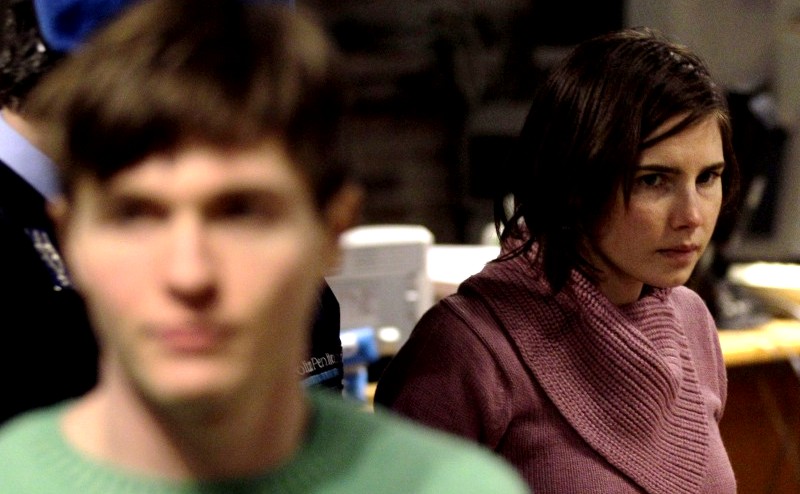
Amanda Knox has stated several times on national TV that she would like to visit Meredith’s grave.
Meredith’s father responded very firmly that this was quite out of the question. The family will never approve. Perhaps predictably, Raffaele Sollecito then announced triumphally that he had already been.
We can be sure that this exchange will do them no good at all in the Florence court, where the prospects of Judge Massei’s special considerations (which lopped five years off their sentences) being re-allowed by the Nencini court now seem pretty dim.
Other than as a ghoulish competition, can this be seen any other way? Last Saturday, Skeptical Bystander, no great lover of the perps, aired the suggestion that we might be seeing a new psychological phase coming into play
Skeptical Bystander
My thinking has evolved somewhat about the report that RS visited Meredith’s grave, as well as about AK’s non-stop chatter about doing so with the Kerchers and her grotesque appropriation of Meredith.
I just caught part of a documentary treatment of the Menendez case, wherein two brothers, Lyle and Eric, killed their parents. Both were sentenced to life in prison. In a probation report, Lyle is quoted as saying he has found peace by visiting his parents’ grave, asking for forgiveness, and understanding that they have forgiven him.
It is entirely possible that both AK and RS want forgiveness from Meredith and from her family. What they don’t seem to realize is that they can’t take shortcuts or be given a free pass. Lyle Menendez got sentenced for his crime and began the process of self-examination that leads to accountability.
We asked two of our posting psychologists if we could indeed be seeing something like this. With their agreement, this is their email exchange, in which they both concede that Skeptical Bystander may have had a point:
Psychologist A:
It is entirely probable they want, indeed crave, ‘forgiveness’. The problem is that dysfunctional or disturbed personalities may be able to be aware of their guilt, but not of their shame.
The guilt would want the forgiveness, but the process that leads to the resolution that is forgiveness will not occur - indeed I believe cannot occur- until the shame is ‘owned’.
Just judging from Raffaele’s and Amanda’s faces alone, I would estimate that Raff is slightly nearer than Amanda in approaching his own shame. Unfortunately I see zero in Amanda, and therein lies the huge problem.
If someone lacks sincerity, someone else or circumstances cannot make them more sincere - what I call authentic. It has to come from self-realization.
That’s my ‘take’!
Psychotherapist B:
At a certain point, this is all just speculation about someone I’ve never met, so it’s hard to say one way or another.
My best guess would be that in this case neither Knox nor Sollecito has shown any public signs of really being able to admit to themselves that they’ve done anything to be sorry for.
For what it’s worth, my overall impression, based on what’s been made public, is that Knox would likely not ever have killed anyone if she hadn’t been high and in an especially reckless period of her life and influenced by meeting Sollecito.
She might have gone on being somewhat impulsive and aggressive without ever actually harming anyone, and with luck she might have outgrown it in a few years. I think the kind of cruelty we’ve seen in this case is driven by unconscious feelings and motives.
Clearly it pains her to be seen as guilty; the idea that anyone can think that about her bothers her a lot. It’s easier for me to picture her wanting a visit to Meredith Kercher’s grave to somehow clear her of all of this upsetting suspicion, than truly wanting Meredith’s forgiveness - more wanting to get rid of shame than to atone for guilt or repair harm, if that makes sense.
When I think of forgiveness, I think of a more mature kind of experience. It takes maturity and integrity to own that you’ve done something harmful, to withstand whatever feelings of shame and guilt the realization brings, and to seek to make actual reparation.
But anyone can feel haunted by having done a bad thing, and want someone to take the haunting away. I’m reminded of Bill in Oliver Twist - after he kills Nancy he feels sorry for himself and overwhelmed by the fear of retribution, but you couldn’t say he’s exactly seeking forgiveness - well, maybe a two-dimensional version of it.
Psychologist A:
Yes, quite right. It is all dreadfully disheartening, and still shockingly cruel.
I agree deeply about the unconsciousness of what is going on. One would expect immature adolescents to be acting a lot from their unconscious, and one of the troubles with the joint denial of events is that they are preventing themselves (and others) from growing or becoming more conscious, but instead ‘freezing’ themselves at that awful time 6 years ago.
You: “He feels sorry for himself and overwhelmed with the fear of retribution, but you couldn’t say he’s exactly seeking forgiveness—well, maybe a two-dimensional version of it. “
I see true forgiveness as a powerful phenomenon which occurs at a crucial stage of a healing process. I think it is something that occurs, that happens to one, is experienced, and is far greater than anyone’s ego.
I would think that someone who had hardly begun, or who had not at all commenced, upon this process would actually have no idea about what forgiveness might actually look or feel like, or be, in fact - let alone how to arrive at it.
Their consequent confusion might then manifest in ,as you say, wanting a two-dimensional version of it, that could be summed up as merely ‘not wanting to be seen as bad’. So perpetuating the ‘good image(s)’ of themselves, which is a gross evasion.
They certainly want not to be hated, as probably anyone does. But it is a huge chasm to actually doing something about that, and learning to behave in a way that people with conscience find acceptable.
Psychotherapist B:
I think you’re absolutely right about forgiveness - thank you for saying it so well.
Appeal Court Sessions This Wednesday And Thursday Dont Look Very Promising For The Defenses
Posted by Peter Quennell
Expected proceedings and backdrop
The Carabinieri DNA report will be the main item and after an interruption from Sollecito we could see the final summations begin.
It is hard to believe that Doug Preston and other deniers of the plain facts have exulted in recent months that the Florence prosecution and court could be a big plus for the perps in their appeal. Presumably their joy was based on highly out-of-date takes on the 2010 move against Dr Mignini by a rogue Florence prosecutor in front of a rogue Florence judge.
Well, guess what? Both have been edged aside (like Hellmann and Zanetti), and the Florence Appeal Court and the Supreme Court have scathingly reversed Dr Mignini’s (and Dr Giuttari’s) faux conviction. And despite some ill-advised smearing still emanating from the Fischers, Moores, and other Knox parasites, Dr Mignini and his colleagues are seeing their careers and popularity (and 2009 success) riding very high.
Judge Nencini and Prosecutor Crini are both hardened anti-Mafia battlers, and the not-so-hidden hand of the mafia in the Italian media campaign to poison public opinion against the court will not have escaped their attention for sure.
At least half a dozen of the parties on the defense bandwagon are known fellow-travelers of the mafia, and at least two are already headed for court - Luciano Aviello is already there for obstruction of justice, and Mario Spezi is headed there soon for a false and very elaborate framing of murder, a charge which could put him (and maybe Preston) away for a long while. The editor of Amanda Knox’s favorite mouthpiece, Oggi, is another we may see.
The same Florence prosecutors and courts will also be putting Frank Sforza on trial starting this wednesday with a preliminary hearing at which the details of the charges against him will enter the public domain. We will post then at more length. Our past commentary on Sforrza can be read here.
Frank Sforza has been a very close ally of some of the more hotheaded and misleading Amanda Knox supporters (both the Mellases, Steve Moore, Bruce Fischer, Michael Heavey, among others) and if he squeals to keep himself safe and out of jail, their own legal fortunes could take a big fall.
Frank Sforza is also required to appear for trial both in Perugia and Seattle, in both jurisdictions for physical abuse. If he fails to show in Florence (his Rome address is quite well known) we expect to see him nabbed by the police and sent on his way in handcuffs to all three trials.
The same Florence prosecutors and courts are also contemplating new charges against Raffaele Sollecito and his publishing and PR bandwagon for the wild claims in his book, which were designed to poison public opinion agains the court and make him a ton of money. Those claims are a real minefield for Sollecito when he gets up and talks as they conflict both with what his team has said in court and what Knox said in her book.
Knox’s book, which was also designed to poison public opinion against the court and make her a ton of money, is being investigated by the chief prosecutor in Bergamo up north. At a minimum, the Florence prosecutors and judges will already know of this attack on the chief prosecutor which seems enough for a guilty verdict all by itself.
Contexting the DNA report
The main findings of the Carabinieri labs were summarised in the post directly below.
This further take on the context, and on who is up and who is down, was kindly contributed by one of our Italian court-watchers, who has many connections in Florence and Rome, and who sees the prosecution DNA teams as riding high now, and the defense forces and Vecchiotti and Conti as left with with no place to hide.
Dr. Barni and Dr. Berti, the two court-appointed Carabinieri RIS experts, are the authors of various internationally-circulated articles about presumptive blood tests, where they prove the opposite of some of the things the Sollecito—Knox sycophants deny. For example that bleach does decompose quickly when exposed to air and does not react to luminol after some 1-2 days.
Patrizia Stefanoni also has respected publications as a scientific author. In fact, in 2011 she was in the top 25 hits of forensic science with her publications, she has been even in first place with this report.
The Carabinieri RIS note that the refrigerator has no temperature log; from this detail, albeit small within the overall report, we can deduce that Vecchiotti’s laboratory cannot have had ISO 9001 certification or any other international certification, given that the standards would require a temperature log. Apparently the refrigerator doesn’t have an accurate thermometer either, since the Carabinieri measured the temperature using one of their own.
Another detail noted at the beginning is this: the Carabinieri RIS expected the sample volume to be 24 microliters, since this was the remaining volume declared by Conti and Vecchiotti, while Barni and Berti found it to be only between 16 and 17 microliters. They infer that Vecchiotti and Conti might have been inaccurate on the estimation of the remaining amount after quantization, or hypothesize that the content might have evaporated over the last two years because the samples were not wrapped inside a protective film.
Vecchiotti and Conti had been already discredited, and have no credibility in the present appeal trial. However, the RIS finding might deliver a further blow to whatever might be their residual credibility. They had already previously been completely discredited because:
1. They were appointed by judges who are now completely discredited, whose conduct was found illegitimate for reasons of unprecedented gravity, and who received a devastating bashing from the Supreme Court;
2. Vecchiotti and Conti were also discredited by Prosecutor Manuela Comodi in her court cross-eamaination in 2011, as the speciousness and falsehood of their arguments was exposed (this was the famous hearing where they claimed contamination on the ground that “everything is possible” and where Vecchiotti admitted she didn’t request negative controls)
3. Vecchiotti and Conti were discredited scientifically by Novelli’s argument, as he explained that they should have tested the 36-I sample, and as he also explained that that he found no trace of contamination in the Scientific Police laboratory’s work, or any reason to suspect contamination of Meredith Kercher’s DNA, and he explained that attribution could be done accurately based on bio-statistical calculation without requiring a second confirmatory test.
4. Finally, Vecchiotti and Conti were egregiously discredited by the Supreme Court which addressed a manifest issue in their “intellectual honesty”. Here is the Supreme Court ruling, page 65: ” ... a member of the panel of experts could not assume any responsibility for unilaterally narrowing the scope of the mission, which was to be carried out without hesitation or reservation, in full intellectual honesty, giving a complete account of the possible insufficiency of the material or unreliability of the result. (...) “The court mentions sardonically the judge-appointed expert’s “intellectual honesty”, and that is a very striking comment when found in a Supreme Court ruling: since the Cassazione is not a fact-finding panel, they don’t write about factual conclusions unless they appear prima facie as manifest and undisputable.
So the Supreme Court considers there are problems of intellectual honesty in the work of Vecchiotti and Conti, something manifest and obvious; the Court acknowledges they are obvious, something that anyone can see, which does not require a fact-finding by a judiciary organ to be pointed out.
Now the Carabinieri RIS report may bring further discredit upon Vecchiotti and Conti, if they have any credibility left. There are at least two reasons for this:
1) Because the finding of a reliable DNA profile belies the assessment that was given by Vecchiotti and Conti that extraction of a profile would be impossible, and demonstrates that in fact it was possible to extract a reliable profile; incidentally the fact that a Carabinieri RIS test was ordered itself implicitly denies Hellmann-Zanetti’s assessment that any result from 36-I would anyway be useless because contamination could have occurred outside the laboratory; but also it credits Novelli while it discredits Veccchiotti and Conti on a scientific level, because it explicitly denies the idea that small (Low Template) DNA amounts are unreliable.
2) Because the Carabinieri RIS test employs the method proposed by Novelli, that is to couple Stefanoni’s “˜biologic’ analysis method with the statistical probability assessment method, in order to come to a certain attribution. Moreover, the Carabinieri RIS also point out that they can do this by assessing only 11 loci from a complex trace which also has foreign alleles (whereas trace 36-B analysed by Stefanoni was a “˜clean’, non-mixed profile matching a 17-loci sequence).The Carabinieri RIS ran the test in “˜duplicate’ while Stefanoni made a single profile extraction. The Carabinieri point out that they can do this ““ divide even a smaller and more complex trace, and test it for comparison even on a smaller number of loci - because they now have “a system with extremely higher analytical performance which is able to provide result quantitatively and qualitatively better compared to previous systems”.
Sunday, November 03, 2013
Knox Apologists Attempt To Bend Congress; But Nobody Important Turns Up
Posted by Our Main Posters
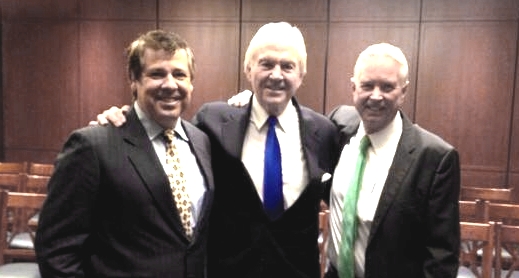
From the left: Steve Moore, John Douglas, and Michael Heavey.
In a room for hire at the Congress they made presentations of their misleading takes on the case to a near-empty room.
Senator Cantwell was apparently there briefly but took off as soon as she could. No other elected leaders were seen to be there.
There was seemingly no media coverage except for a sole post by another Knox apologist on the Infamous Ground Report.
These are hardly the most impartial or for that matter truthful and accurate observers of the case.
Click through for our numerous takedowns of the hapless Steve Moore, and John Douglas, and Michael Heavey.
Thursday, October 31, 2013
Why DNA Test Results 6 November May Leave No Further Argument Over Knox And Sollecito Guilt
Posted by Peter Quennell

[Above: an image of similar testing in the same Carabinieri laboratory in north Rome]
The official results of the tests by the Carabinieri laboratory will be made public by Judge Nencini in court on 6 November.
The report and attachments are reported to be more than 100 pages long. Andrea Vogt has already warned that no assumptions should be made yet that we know the full story. But already for the defenses, matters do not look pretty.
- 1) It sounds like the result of the DNA near the top of the blade (see images below) shows conclusively that it is another sample of Knox’s DNA. Given where the sample came from it could be blood DNA and add further proof to the notion that Knox was injured while struggling with Meredith.
2) The low-copy-number amplification technique used was almost identical to that used by Dr Stefanoni to prove that it was Meredith’s DNA on the blade of the knife - actually that was a larger sample. Judge Massei’s court accepted this, Judge Hellmann’s consultants tried very hard to undermine it, and the Supreme Court ruled that they did not even come close.
Earlier this year, our main poster Fly By Night in a post worth re-reading explained just how conclusively the results of that first testing pointed to both Meredith and Knox.
As is typical of all DNA analyses, Stefanoni proceeded to amplify the results to a point where an electropherogram would reveal meaningful “peaks” and found that a resultant 13 pairs of peaks corresponded precisely to peaks derived from a known sample of Meredith Kercher’s DNA!
In this case it is pointless to attempt to argue that Stefanoni somehow exceeded the amplification limits of her equipment. As outlined in the DNA discussion above, the typical problems associated with an amplification of low levels of DNA are related to peak imbalances, enhanced stutter, allele drop-outs, or allele drop-ins.
In this case there was nothing but a perfect match for Meredith that even Carla Vecchiotti and Stefano Conti could not deny in court.
Stefanoni had clearly identified an identical match for Meredith’s DNA on the blade of Sollecito’s kitchen knife, leaving Vecchiotti and Conti no other option than to argue for “contamination” in court.
However, it was convincingly demonstrated by Stefanoni and all evidence handlers that from knife collection through laboratory analysis no reasonable opportunity for contamination with Meredith’s DNA existed.
Dr Stefanoni’s testing of all the DNA from the crime scene was done in front of some defense observers. Those who were there saw her do nothing wrong. Dr. Patrizia Stefanoni, Dr. Renato Biondo, Professor Giuesppe Novelli, Professor Francesca Torricelli, Luciano Garofano, Elizabeth Johnson and Greg Hampikian have all confirmed that Meredith’s DNA was on the blade of the knife.
It looks as if the prosecution has now achieved a clean sweep of all of the of DNA testing. Meredith’s DNA on the lower blade of the knife seems even more conclusively a firm given, and so does Knox’s on the upper blade and the handle.
We are where we were back in 2008 before trial, where other defense lawyers might have suggested to their clients to select a trial of the short form type - the same choice that will see a somewhat penitent Guede out on work release in two years, no more.
But instead, their clients could now be facing life sentences for that bad choice.
Image: looking along the blade toward the handle, both sides of the knife
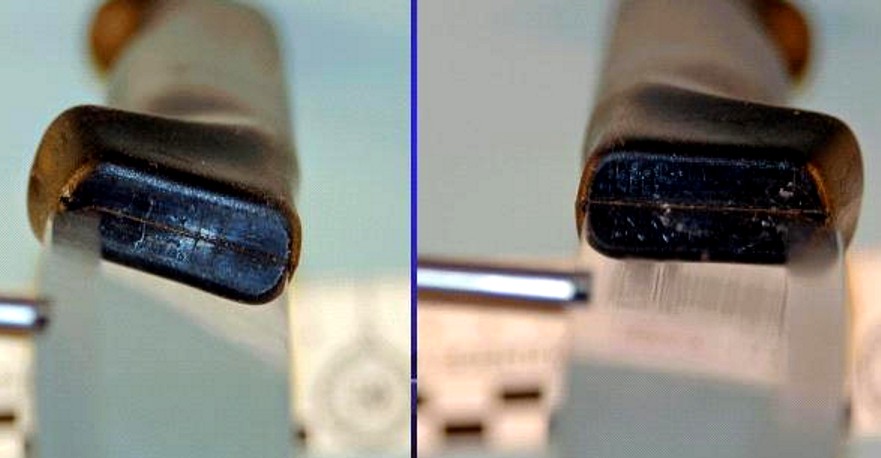
Here is an image showing the I trace in the location described in the post with credit to Iodine of PMF and the Case Wiki
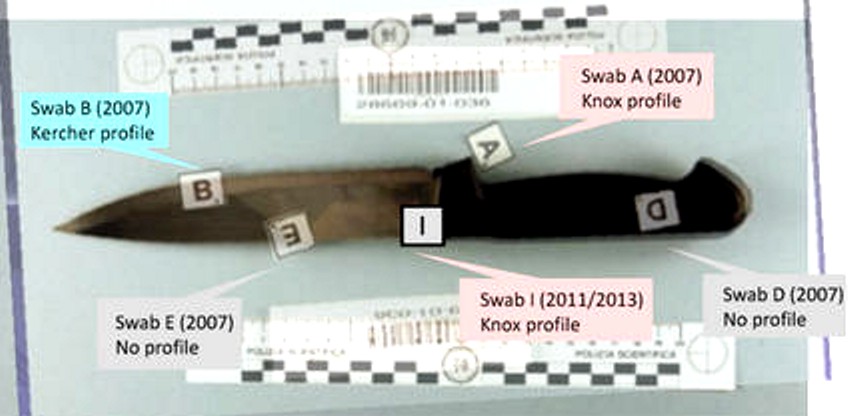
Monday, October 28, 2013
Some Hard Truths Sollecito PR Puppet Sharlene Martin Omits In Her Misleading Invite To The Congress
Posted by Our Main Posters
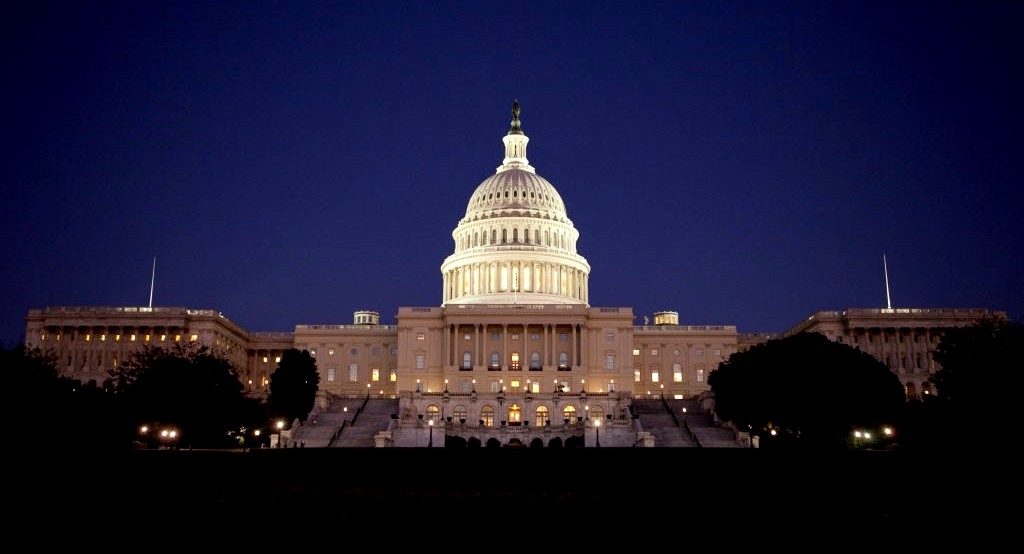
Dear Sharlene Martin:
Please dont say we didnt warn you before. In this notice of a Congressional “briefing” (read: paid highly misleading PR) you once again gloss over a number of hard truths.
You might well be advised to head to higher ground. The US Congress and the Administration will soon be left in no doubt about the correct facts of the case against Sollecito and Knox, as Italian law enforcement start to reach out to their counterparts in the FBI, and as they charge mischief-makers with obstruction of justice in the case, and as more and more reporters in the US and UK media wisen up.
Against your client, this was always a very strong case. And this alone has your client cooked. Here are some other corrections and correct background to the false claims you have just made.
- 1) Senator Cantwell was already burned by associating too closely with your radioactive group. She spoke out daffily for Amanda Knox several years ago - and then, duly warned, she went quiet again. Ask her congressional staff for the story to that. And read our past heads-ups for Senator Maria Cantwell here and here.
2) Your client Raffaele Sollecito wrote the most defamatory and misleading book about an Italian case in many years. Key claims have been repudiated by his own father on Italian TV. As his case is ongoing Sollecito is meant to fight it in the (very fair) Italian courts, not poison public opinion to lean on those courts. Sollecito is being considered for charges of obstruction of justice for the book and much else in the media, and you and the publishers may be charged too.
3) This is NOT a third trial. It is a re-run of a first appeal. If the very well-run and highly decisive Massei trial of 2009 had been run in the US or UK it is hard to see what grounds if any, any appeal judge would accept for appeal. Your client would be near the end of his sixth year in prison. And it is known that the Hellmann Appeal and the DNA consultancy were both bent by Sollecito’s and Knox’s own teams (corrective measures have been taken with more to come) so the 6-year process is essentially your own team’s fault.
4) John Douglas’s highly self-serving chapters on the case are among the silliest ever written in a crowded field. The very vain Douglas starts with the totally false premise that Knox was forced to confess after many many hours, and from there on out it is all downhill. He takes a faux position essentially identical to that of Saul Kassin. Read about Kassin’s own spurious and highly self-serving take on Knox’s “forced confession” here and here and here.
5) Steve Moore lacks the correct expertise to analyse this case and he was never the ace crime scene investigator you claim. A dozen or more posts here show how unreliable and rambling he is. Among other things he appeared on a disastrous panel (with a team almost identical to yours - and an audience that peaked at 35) at Seattle University a couple of years ago. Read what two very astute lawyers thought of his man-in-a-bubble performance here and here.
6) The hapless Michael Heavey was officially reprimanded for his bizarre intervention in the case. He was also on the disaster of a panel at Seattle University. He has got the basic facts wrong again and again and again. Here he is getting the facts wrong five years ago. Here is his association with Frank Sforza, a key mis-stater of the key facts of the case and serial defamer of the Italian officials involved, who he was financially supporting - and who now faces three separate trials of his own.
7) And the hapless John Q Kelly? This is a tough field in which to come out ahead but John Q was perhaps the silliest talking head for Knox and Sollecito on TV. He babbled on in the media about a railroading that never took place. Read how even his own colleagues considered him to have been duped here and here.
A Congressional briefing panel that is not made in heaven, that is for sure. Stay tuned. There is more to come.
